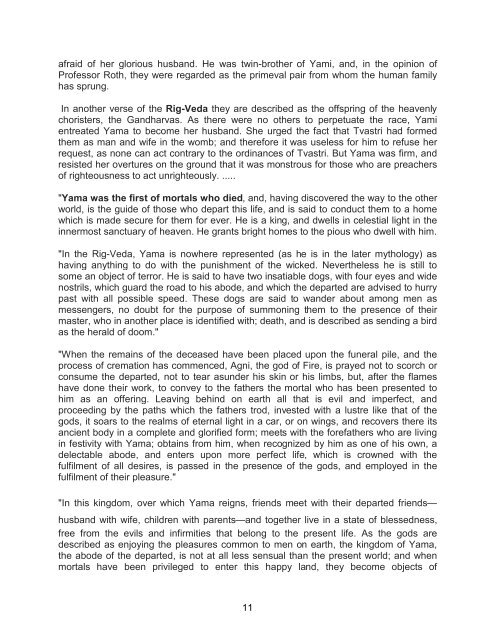KathaUpanishad
You also want an ePaper? Increase the reach of your titles
YUMPU automatically turns print PDFs into web optimized ePapers that Google loves.
afraid of her glorious husband. He was twin-brother of Yami, and, in the opinion of<br />
Professor Roth, they were regarded as the primeval pair from whom the human family<br />
has sprung.<br />
In another verse of the Rig-Veda they are described as the offspring of the heavenly<br />
choristers, the Gandharvas. As there were no others to perpetuate the race, Yami<br />
entreated Yama to become her husband. She urged the fact that Tvastri had formed<br />
them as man and wife in the womb; and therefore it was useless for him to refuse her<br />
request, as none can act contrary to the ordinances of Tvastri. But Yama was firm, and<br />
resisted her overtures on the ground that it was monstrous for those who are preachers<br />
of righteousness to act unrighteously. .....<br />
"Yama was the first of mortals who died, and, having discovered the way to the other<br />
world, is the guide of those who depart this life, and is said to conduct them to a home<br />
which is made secure for them for ever. He is a king, and dwells in celestial light in the<br />
innermost sanctuary of heaven. He grants bright homes to the pious who dwell with him.<br />
"In the Rig-Veda, Yama is nowhere represented (as he is in the later mythology) as<br />
having anything to do with the punishment of the wicked. Nevertheless he is still to<br />
some an object of terror. He is said to have two insatiable dogs, with four eyes and wide<br />
nostrils, which guard the road to his abode, and which the departed are advised to hurry<br />
past with all possible speed. These dogs are said to wander about among men as<br />
messengers, no doubt for the purpose of summoning them to the presence of their<br />
master, who in another place is identified with; death, and is described as sending a bird<br />
as the herald of doom."<br />
"When the remains of the deceased have been placed upon the funeral pile, and the<br />
process of cremation has commenced, Agni, the god of Fire, is prayed not to scorch or<br />
consume the departed, not to tear asunder his skin or his limbs, but, after the flames<br />
have done their work, to convey to the fathers the mortal who has been presented to<br />
him as an offering. Leaving behind on earth all that is evil and imperfect, and<br />
proceeding by the paths which the fathers trod, invested with a lustre like that of the<br />
gods, it soars to the realms of eternal light in a car, or on wings, and recovers there its<br />
ancient body in a complete and glorified form; meets with the forefathers who are living<br />
in festivity with Yama; obtains from him, when recognized by him as one of his own, a<br />
delectable abode, and enters upon more perfect life, which is crowned with the<br />
fulfilment of all desires, is passed in the presence of the gods, and employed in the<br />
fulfilment of their pleasure."<br />
"In this kingdom, over which Yama reigns, friends meet with their departed friends—<br />
husband with wife, children with parents—and together live in a state of blessedness,<br />
free from the evils and infirmities that belong to the present life. As the gods are<br />
described as enjoying the pleasures common to men on earth, the kingdom of Yama,<br />
the abode of the departed, is not at all less sensual than the present world; and when<br />
mortals have been privileged to enter this happy land, they become objects of<br />
11


















